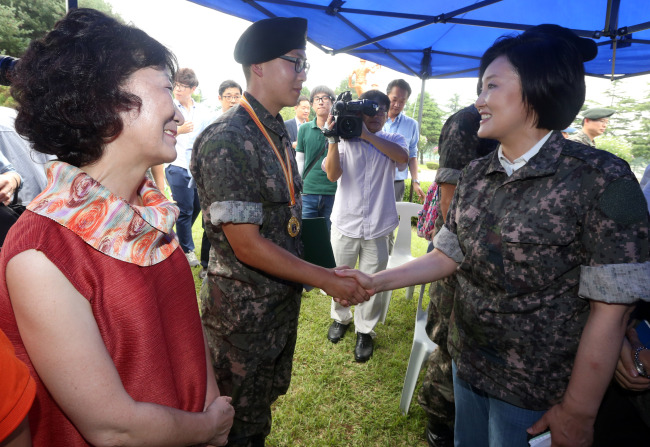NONSAN, South Chungcheong Province ― The acting chair of the main opposition party visited the Army’s largest boot camp on Wednesday to raise awareness of hazing and physical violence among enlisted recruits in the wake of one of the worst abuse incidents on record in the South Korean military.
Rep. Park Young-sun, who heads the New Politics Alliance for Democracy, visited the Korea Army Training Center at Nonsan, South Chungcheong Province.
The three-term lawmaker repeatedly told senior Army officers during her visit that hazing and violence in the military’s lower ranks must stop.
“We must make a military that mothers can entrust their children with,” Park said in a speech in front of 1,700 newly recruited Army privates and their families.
Park’s visit aimed to address public outcry to change the military’s restrictive culture after media reports about a murder in the Army’s 28th Division surfaced earlier this week.
Rep. Park Young-sun, who heads the New Politics Alliance for Democracy, visited the Korea Army Training Center at Nonsan, South Chungcheong Province.
The three-term lawmaker repeatedly told senior Army officers during her visit that hazing and violence in the military’s lower ranks must stop.
“We must make a military that mothers can entrust their children with,” Park said in a speech in front of 1,700 newly recruited Army privates and their families.
Park’s visit aimed to address public outcry to change the military’s restrictive culture after media reports about a murder in the Army’s 28th Division surfaced earlier this week.

Five mid-level enlisted personnel allegedly beat a private to death in the 28th division’s barracks this April. Pictures of the victim, surnamed Yoon, were shown to lawmakers and reporters this month. The images showed the upper torso of Yoon covered with bluish-purple bruises.
An investigation later reported that Yoon’s beatings by other senior soldiers had been regularly committed in the months prior to his tragic death. Allegations that Yoon had also been sexually abused arose as well.
Other soldiers had stayed silent, apparently fearing that they could be similarly bullied if they spoke out.
Military authorities conducted an Army-wide audit in April to unearth other hazing cases. The study showed that there had been approximately 3,900 unreported cases of violence and hazing among junior conscripts in April alone.
Families of new recruits who had come to visit the training center on Wednesday talked with Rep. Park.
“I have been lucky and spoke with my son over the telephone five times while he was at boot camp,” one mother said. “But after hearing about (the 28th Division murder) incident, I became extremely worried.”
“Some kind of system to prevent such incidents in the future must be set up,” she said.
Heckling new privates is a well-known part of South Korea’s military culture, and even a subject of many jokes. Verbal abuse is commonplace. New recruits are also deprived of basic rights, adding to the emotional pressure of serving.
In some cases, higher-ranking enlisted soldiers forced new recruits to sleep with their gas masks on if they snored. Junior soldiers were sometimes not allowed to watch television or eat certain snacks during meals. In other cases, privates are deprived of their right to simply smile in the name of keeping soldiers disciplined.
Rep. Park pledged to develop plans to address the chronic problem in the barracks: “Our military must be strong, but it must also be healthy. This means its men and women must be both physically and mentally healthy. We must find some middle balance between military strength and a more wholesome culture.”
By Jeong Hunny (hj257@heraldcorp.com)
-
Articles by Korea Herald






![[From the Scene] Monks, Buddhists hail return of remains of Buddhas](http://res.heraldm.com/phpwas/restmb_idxmake.php?idx=644&simg=/content/image/2024/04/19/20240419050617_0.jpg&u=20240419175937)




![[Graphic News] French bulldog most popular breed in US, Maltese most popular in Korea](http://res.heraldm.com/phpwas/restmb_idxmake.php?idx=644&simg=/content/image/2024/04/18/20240418050864_0.gif&u=)




![[From the Scene] Monks, Buddhists hail return of remains of Buddhas](http://res.heraldm.com/phpwas/restmb_idxmake.php?idx=652&simg=/content/image/2024/04/19/20240419050617_0.jpg&u=20240419175937)

![[KH Explains] Hyundai's full hybrid edge to pay off amid slow transition to pure EVs](http://res.heraldm.com/phpwas/restmb_idxmake.php?idx=652&simg=/content/image/2024/04/18/20240418050645_0.jpg&u=20240419100350)

![[Today’s K-pop] Illit drops debut single remix](http://res.heraldm.com/phpwas/restmb_idxmake.php?idx=642&simg=/content/image/2024/04/19/20240419050612_0.jpg&u=)